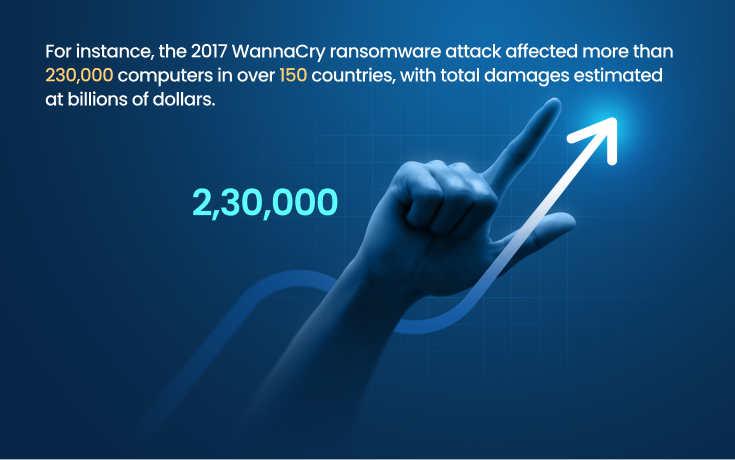An ounce of prevention is worth a pound of cure, Benjamin Franklin famously said. This timeless piece of wisdom rings especially true in today’s digital age, where the cyber threats landscape is constantly evolving.
In 2023, a report by Cybersecurity Ventures predicted that cybercrime would cost the global economy a staggering $10.5 trillion annually by 2025, up from $3 trillion in 2015.
This exponential increase underscores not only the growing sophistication and frequency of cyber threats but also the pressing need for businesses to bolster their defences with cyber insurance.
Imagine a bustling digital startup, on the cusp of groundbreaking innovation and poised for exponential growth. Overnight, a sophisticated cyberattack cripples its operations, exposes sensitive customer data, and erodes public trust.
This scenario, far from being hypothetical, mirrors the plight of many modern enterprises. It vividly illustrates why cyber insurance has transitioned from a nice-to-have to an essential component of business strategy in the digital realm.
Understanding Cyber Insurance
At its core, cyber insurance is designed to mitigate the risks associated with online activities and digital operations. It provides businesses with a financial safety net and expert support in the aftermath of cyber incidents, including data breaches, cyber theft, extortion demands, and more.
Over the years, cyber insurance policies have evolved from simple liability covers to comprehensive solutions addressing a wide spectrum of cyber risks.
Key Benefits of Investing in Cyber Insurance
1. Financial Protection Against Cyber Incidents
The primary allure of cyber insurance lies in its promise of financial protection. Cyber incidents can incur direct costs like forensic investigations, data recovery, and legal fees, alongside indirect costs such as business interruption and loss of goodwill.
For instance, the 2017 WannaCry ransomware attack affected more than 230,000 computers in over 150 countries, with total damages estimated at billions of dollars.

Businesses with cyber insurance were able to recover more swiftly, highlighting the importance of having a financial cushion.
2. Support for Business Continuity
Cyber insurance policies often extend beyond mere financial compensation, offering resources for business continuity. Insurers provide access to top-tier cyber response teams, helping businesses minimise downtime and maintain operational resilience.
This support is crucial for ensuring that a temporary disruption does not turn into a permanent closure.
3. Compliance with Regulatory Requirements
With the increasing enactment of data protection laws globally, such as the GDPR in Europe and the CCPA in California, businesses are under significant pressure to comply with stringent regulations.
Cyber insurance policies can cover regulatory fines and penalties, and more importantly, they help businesses establish practices and protocols that pre-emptively meet these regulatory standards.
4. Risk Management and Prevention Resources
Many cyber insurance providers offer risk assessment and management tools as part of their policy packages. These resources enable businesses to identify vulnerabilities in their systems and undertake preventative measures to ward off potential cyber threats.
Regular risk assessments and access to cybersecurity best practices can dramatically reduce the likelihood of a successful attack.
5. Reputation Management and Customer Trust
The fallout from a cyber incident can be devastating to a company’s reputation. Cyber insurance often includes crisis management services, which play a critical role in managing public perception post-incident.
Prompt and effective communication, facilitated by professional PR support, can help restore customer confidence and safeguard the company’s reputation.
Real-World Case Studies

Case Study 1: The NotPetya Attack on Maersk
In June 2017, the global shipping giant Maersk fell victim to the NotPetya malware attack, leading to a complete shutdown of its IT systems worldwide. The company incurred losses of up to $300 million due to business interruption and system recovery costs. Maersk’s recovery was significantly aided by its cyber insurance coverage, which covered a portion of the financial losses and supported the extensive recovery efforts.
Case Study 2: The Sony Pictures Hack
In 2014, Sony Pictures experienced a devastating cyberattack that led to the leak of confidential data, including personal employee information and unreleased films. The incident resulted in significant financial losses and reputational damage. Sony’s cyber insurance policy played a pivotal role in mitigating the financial impact and supported the company through the recovery process.
Conclusion
In an era where digital threats loom larger and more menacingly than ever, cyber insurance emerges not just as a shield, but as a strategic asset for businesses. It provides a comprehensive approach to managing and mitigating digital risks, offering financial protection, support for business continuity, compliance assistance, risk management resources, and reputation management.
As the digital landscape continues to evolve, so too will the nature of cyber threats. Businesses must stay ahead of the curve, and investing in cyber insurance is a crucial step in this journey. With real-world examples like Maersk and Sony Pictures underscoring the tangible benefits of cyber insurance, the message is clear: in today’s digital age, being prepared is not an option—it’s a necessity.


